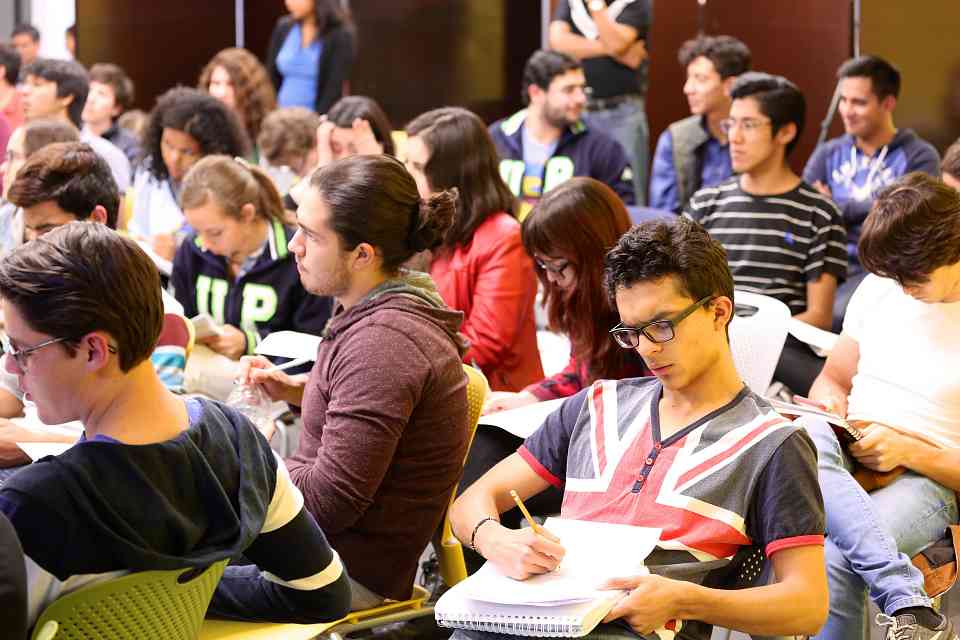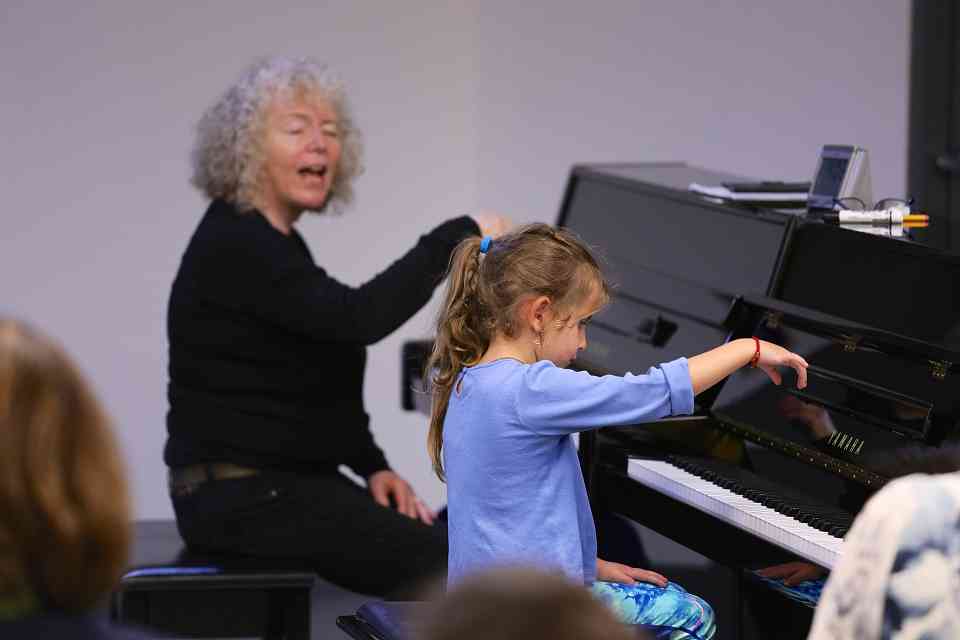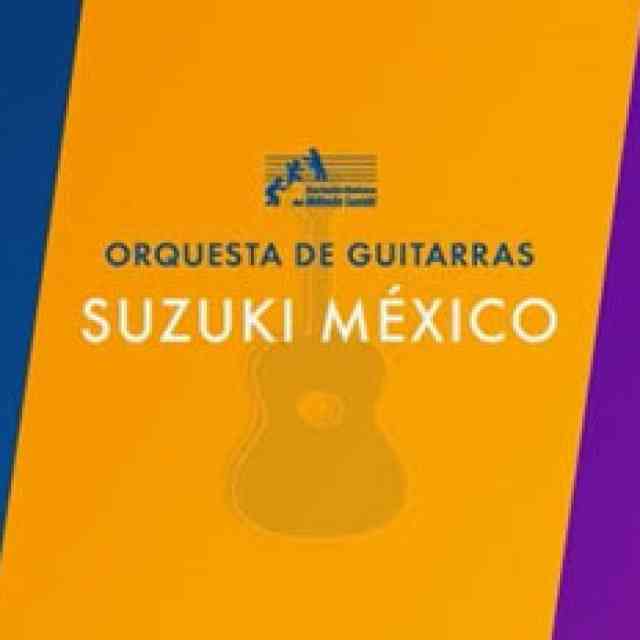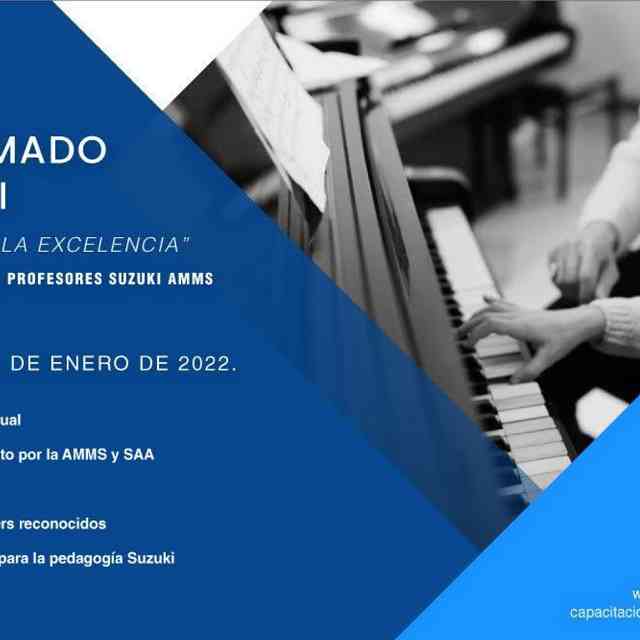
FILOSOFÍA SUZUKI
En la Universidad Panamericana en la Ciudad de México
por: Leslie Mizrahi
Me llena de felicidad y admiración el escribir acerca del curso de Filosofía Suzuki que ha sido ofrecido dentro de una universidad.
La Universidad Panamericana en la Ciudad de México abrió recientemente la Escuela de Bellas Artes con su primer programa, la Licenciatura en Música e Innovación, que inició en Julio del 2016. Dentro de esta licenciatura existen tres especialidades: interpretación, composición y educación musical. Esta es la primera vez en México en la que una universidad privada ofrece la Licenciatura en Música.
La visión del Dr. Gabriel Pliego, director de la Escuela de Bellas Artes, para esta Licenciatura, es que un músico debe tener una formación integral: con un alto nivel de musicalidad, incluyendo un alto nivel interpretativo, conocimientos amplios de diferentes pedagogías para la enseñanza musical y una amplia gama de habilidades como emprendedor.
En su visión, el educador del siglo XXI necesitará tener también una excelente calidad interpretativa, así como habilidades para la composición musical; de la misma forma que el compositor necesitará ser un excelente intérprete y maestro y el músico instrumentista deberá tener grandes habilidades en composición y de enseñanza; todos ellos necesitarán ser capaces de crear o transformar sus propios empleos o empresas, convirtiendo de esta manera a cada uno de los estudiantes en líderes.
Por otro lado, el Dr. Gabriel Pliego ha sido presidente de la Asociación Mexicana del Método Suzuki (AMMS) desde el 2005. Gabriel concluirá sus deberes como presidente de la AMMS el próximo mes de octubre de este año. Él acogió el Método y la Filosofía Suzuki como propia y ha enseñado violín con este método desde hace más de 12 años.
Sabiendo que la Filosofía Suzuki ha probado ser un método de enseñanza excelente, el Dr. Pliego ha incluido, como material curricular, el curso completo de “Filosofía”, el cual fue creado e impartido por la maestra Caroline Fraser, Teacher Trainer de la SAA. El curso de “Introducción a la Filosofía Suzuki” tiene normalmente una duración de 4 días y de esta forma se ha impartido con gran éxito en todos los países de América Latina, por más de 30 años a la fecha.
En marzo del 2017, este curso creó historia, ya que fue ofrecido, por primera vez en todo el Continente Americano, como material curricular obligatoria de una carrera universitaria. Se impartió como un curso de 32 horas, durante seis días, repartidos en dos fines de semana. Caroline subrayó que, además de haber comprendido la pedagogía del Método Suzuki desde el punto de vista del maestro, estos estudiantes de primer año de la carrera obtuvieron una importante introspección hacia el desarrollo de sus propias habilidades, de sus hábitos de estudio y de su preparación para tocar en conciertos.
Como maestra de piano Suzuki con 12 años de experiencia, miembro del consejo directivo de la AMMS desde hace 7 años, recientemente electa para la presidencia de la misma, y como estudiante de la primera generación de esta nueva carrera en la Universidad Panamericana, estoy muy emocionada y muy entusiasmada de reconocer que la Filosofía Suzuki está entrando al mundo profesional en México.
Estoy segura de que este importante paso, dará al Método Suzuki un lugar bien merecido dentro del mundo de la educación musical; ya que permitirá que los estudiantes universitarios acojan la visión del Dr. Sinichi Suzuki y tengan la oportunidad de aplicarlo, tanto en sus propias vidas, como en las de sus futuros alumnos, como una herramienta invaluable para ser y crear mejores seres humanos. Yo veo esta oportunidad como un punto de lanzamiento para su expansión a manos de la nueva generación de músicos.
Mis más sinceras felicitaciones al Dr. Gabriel Pliego y a la Maestra Caroline Fraser por este paso tan importante en la educación musical. Estoy segura de que poco a poco y paso a paso, esta primera acción crecerá y se expandirá, asegurándonos tener una nueva generación de maestros quienes tendrán nuevas herramientas de enseñanza y quienes difundirán el sueño del Dr. Shinichi Suzuki de crear un mundo mejor a través de la música.
It is with great pleasure and admiration that I write about the Suzuki philosophy course being offered in a university setting.
The Universidad Panamericana in Mexico City recently opened the School of Fine Arts. The first program that is being offered, starting July 2016, is the Bachelor in Music and Innovation, with three different specialties: performance, composition, and music education. This is the first time in Mexico that a private university offers a degree in music in the whole country.
The School of Fine Arts is directed by Dr. Gabriel Pliego, whose vision for the bachelor program, is that of a musician formed with a high level of musicianship, including an excellent level of performance, ample knowledge of different music teaching pedagogies, and a wide set of entrepreneurial skills.
In his vision, the 21st century music educator will also need to have excellent performing and composition skills; the same way that a composer will need to be a great performer and teacher, and the performer will need to have great skills in composition and teaching; and all of them will need to be able to create or transform their own jobs or companies. The School of the Arts therefore aims to create leaders in each one of the students.
Furthermore, Gabriel Pliego has been the President of the Mexican Suzuki Association since 2005. Gabriel will finish his duty as president of the Association in October 2017. He has embraced the Suzuki method and philosophy as his own and has taught violin with this method for more than 12 years.

Knowing that the Suzuki philosophy has proved to be an excellent teaching method, Dr. Pliego has included as part of the curriculum the complete “Filosofía” course, created and taught by SAA Teacher Trainer Caroline Fraser. The “Introduction to the Filosofía Suzuki” course is usually a four-day course, which has been successfully offered all over Latin America for more than 30 years now.
In March 2017, this course made history, for it was offered, for the first time in America, as part of the obligatory curriculum of a university career. It was a 32-hour course, taught over six days, during two long weekends. Caroline remarked that apart from understanding the Suzuki pedagogy from the teachers’ point of view, these first-year students gained an insight into their own skill development, practice habits and performance preparation.
As a Suzuki piano teacher with 12 years’ experience, a board member of the Mexican Suzuki Association for the past seven years, recently elected president of the Mexican Suzuki Association, and as a student of the first generation of this new career at Universidad Panamericana, I am thrilled and excited to acknowledge that the Suzuki philosophy is now entering the professional world in Mexico.
I am sure that this important step will give the Suzuki method a well-deserved place in the music education realm, for it will allow the university students to embrace Dr. Shinichi Suzuki’s vision and enable them to apply it both in their own lives and in their future students as an invaluable tool to become and to create better human beings. I see this opportunity as a launching board for its expansion in the hands of the new generations of musicians.
My sincere congratulations to Dr. Gabriel Pliego and to Ms. Caroline Fraser for this very important step in music education. I am sure that little by little, step by step, this first action will grow and expand, assuring that we will have a new generation of teachers who will have better teaching tools and will spread Dr. Shinichi Suzuki’s dream of a better world through music.








